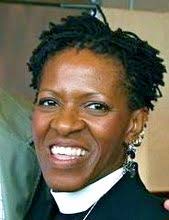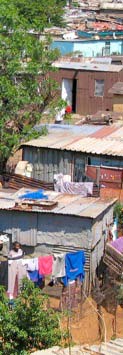By David Crumm
 In the new book Made for Goodness, Desmond Tutu and his daughter Mpho Tutu welcome us into their South African family -- a courageous community of relatives and friends who produced one of the great miracles in modern history: the end of apartheid.
In the new book Made for Goodness, Desmond Tutu and his daughter Mpho Tutu welcome us into their South African family -- a courageous community of relatives and friends who produced one of the great miracles in modern history: the end of apartheid.
The book is a unique choice for small-group discussion or daily inspirational reading. Most inspirational books give us cheap grace and simplistic solutions to life's challenges. In contrast, Made for Goodness is about costly grace -- goodness so heroic in many cases that your heart will ache at the sacrifices made by ordinary men and women. There's no tiptoeing through soft-focus fields of flowers here to inspire and reassure us. In this book, you'll read about real-life experiences like the day Desmond Tutu encountered a horrific site of mass murder. In another section, you'll read about a woman who survived days of torture by apartheid-era thugs without ever betraying the safety of her friends and family -- and died as a result. In short, you'll read about ordinary people who became true saints. As surprising as this may sound, in the end, this is a book about finding joy in daily life.
The Rev. Mpho Tutu, 46, is an Episcopal priest who was ordained six years ago by her father, Archbishop Emeritus of Cape Town Desmond Tutu, now 78. She lives in the U.S., specializes in spiritual direction, and leads annual spiritual pilgrimages back to South Africa. She is the founder and executive director of the Tutu Institute for Prayer and Pilgrimage. She is married to journalist Joseph Burris and they have two daughters, Nyaniso and Onalenna.
Here are the highlights of David Crumm's interview with the Rev. Mpho Tuto:
Let's begin with the most startling truth in this book. Despite everything you, your father, and the South African people have witnessed in this long struggle -- despite all the violence and hatred -- this book is about joy. How can anyone possibly find joy in the midst of such heartache?
This comes from the deep recognition that evil will not and cannot and does not have the last word. For my father and me, this is pinned to our hope as Christians, but even the evidence of history is that evil does not have the last word. Think of the number of dictatorships, the number of tyrannies, that have marched through history as though they will always and ever reign supreme. Yet, they did not. Look back even over the past half a century and see the dictatorships that have bitten the dust, see the walls that have come tumbling down, see the tyrannies that have come undone.
In the face of human indomitability, evil cannot triumph -- so we can find goodness and hope even in the heart of some of the most horrible things that we have experienced -- and that is true for my father on an epic scale.
My life is small in comparison to my father's life, yet I have seen this as well in so many small ways. I remember making a pastoral visit to a child in the hospital who had been sexually abused. At that time, my daughter was 5 and this girl in the hospital was about 8. By the time I visited her, she had been through a whole day of describing her ordeal to doctors and to the police. She was strung out as she sat there with her mother. The mother, too, was just completely exhausted. In making this visit, I had not been able to find someone to take care of my own daughter, so I brought her along with me with crayons and a snack to pass the time.
But you know what happened? That 8-year-old saw my daughter and she wanted to play! Within minutes, they were on the floor together, sharing crayons and snacks. That's what I'm talking about. Hope. Joy. You see that and you know that even the worst cannot defeat us, because the best is always yearning and struggling to come out in our lives.
In your own passages in this new book, you always seem to have your eyes open to find hope and joy and wisdom in unexpected places. In one journey you took to Vancouver, you found wisdom in a man who most people would discuss as merely the aide, the translator in this case, for the Dalai Lama. That's an inspiring story.
And you include a story in the book about one of your pilgrimages back to South Africa in which you took Americans to visit the impoverished black township of Gugulethu outside Cape Town. There, you found the amazing "Mrs. Maphosela." Tell us about that experience. First, how is her name pronounced?
 Mrs. Mah-PAW-selah. She lives in one of the black townships outside Cape Town and one day, some years ago, she had seen a young child out in the street at a time when a child shouldn't have been there all alone. "Where's Mommy?" she asked, and the child said, "Mommy is sick." So, Mrs. Maphosela gave the child something to eat.
Mrs. Mah-PAW-selah. She lives in one of the black townships outside Cape Town and one day, some years ago, she had seen a young child out in the street at a time when a child shouldn't have been there all alone. "Where's Mommy?" she asked, and the child said, "Mommy is sick." So, Mrs. Maphosela gave the child something to eat.




